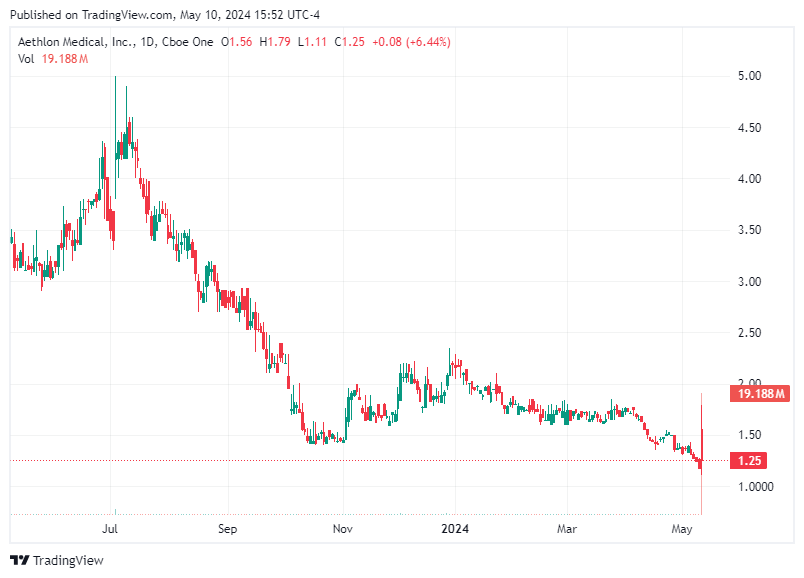Medical Therapeutics Company Announces Positive Study Results For Cancer Treatment Technology
The Hemopurifier® has earned the prestigious designation of Breakthrough Device from the U.S. Food and Drug Administration (FDA).
Aethlon Medical, Inc. (Nasdaq: AEMD), a medical therapeutic company, has recently announced a leap forward in its mission to combat cancer and life-threatening infectious diseases. The breakthrough comes in the form of positive results from an in vitro binding study of its Hemopurifier® technology, specifically focusing on its efficacy in removing extracellular vesicles (EVs) from the plasma of cancer patients. This development signifies a beacon of hope for patients battling solid tumors who have shown stable or progressive disease during anti-PD-1 monotherapy treatment, such as Keytruda® or Opdivo®.

The Innovation Behind the Hemopurifier®
At the heart of Aethlon Medical's innovative approach lies the Hemopurifier®, a clinical-stage immunotherapeutic device designed with a dual purpose—to combat cancer and neutralize life-threatening viral infections. The device operates on a proprietary lectin-based technology, which has demonstrated remarkable capabilities in human studies, including the removal of life-threatening viruses. In pre-clinical studies, the Hemopurifier® has shown the potential to remove harmful exosomes from biological fluids. Exosomes play a significant role in cancer by promoting immune suppression and metastasis, making their removal from the body's system a crucial step in treating cancer effectively. Extracellular vesicles, particularly those bearing PD-L1 on their surface, are known to contribute significantly to the immune suppression seen in cancer patients, facilitating tumor growth and metastasis. The ability to target and remove these EVs directly from patient plasma offers a novel approach in treating cancer, potentially enhancing the efficacy of existing treatments such as anti-PD-1 antibodies.
The positive data from the in vitro binding study represent a promising advancement in the field of oncology. Conducted ahead of Aethlon's planned phase 1 oncology trials in Australia and India, this translational study aimed to provide robust pre-clinical evidence supporting the Hemopurifier's capability. By acquiring small volumes of plasma from patients treated with anti-PD-1 antibodies and running the samples through a miniature version of the Hemopurifier®, Aethlon was able to demonstrate the device's efficacy in removing EVs directly from cancer patient plasma. The analysis, conducted by Cellarcus Biosciences, Inc., employed vesicle flow cytometry—a widely accepted methodology for EV quantification and phenotyping. Although the study did not conclusively prove the removal of EVs bearing PD-L1 due to the small numbers, the descriptive statistics provided by independent statisticians at NAMSA (the contract research organization for the planned Australian oncology study) supported the overall removal of EVs by the Hemopurifier®. With these encouraging results, Aethlon Medical is poised to move forward into the next critical phase of development. The data will be added to the Clinical Investigator Brochure and submitted to the Ethics Committees at the interested clinical sites in Australia and India, marking the next step toward initiating phase 1 oncology trials. These trials aim to assess the safety, feasibility, and dose-finding aspects of the Hemopurifier® in patients with solid tumors.
The Hemopurifier® has earned the prestigious designation of Breakthrough Device from the U.S. Food and Drug Administration (FDA). This designation is reserved for devices that provide more effective treatment or diagnosis for life-threatening or irreversibly debilitating diseases, indicating the Hemopurifier's potential impact. With cancer types where exosomes are known to play a critical role in the development or severity of the disease, the Hemopurifier® presents a promising therapeutic avenue. Aethlon Medical's recent announcement underscores the potential of the Hemopurifier® in revolutionizing cancer treatment. By targeting and removing extracellular vesicles from cancer patient plasma, the device offers a novel approach that could complement existing therapies and provide new hope for patients struggling with solid tumors. As Aethlon prepares to enter phase 1 oncology trials, the medical community eagerly anticipates further developments from this groundbreaking research.
Disclaimer: The information provided in this article is for informational purposes only and is not intended as medical advice, diagnosis, or treatment. It is important to consult a healthcare provider for any health-related concerns and before participating in any medical trial or treatment.

